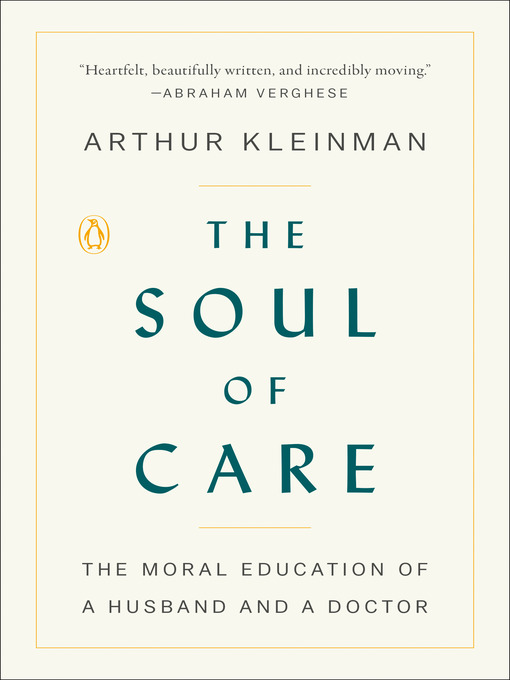
The Soul of Care
The Moral Education of a Husband and a Doctor
آموزش اخلاقی یک حسین و یک دکتر
کتاب های مرتبط
- اطلاعات
- نقد و بررسی
- دیدگاه کاربران
نقد و بررسی

July 15, 2019
A renowned psychiatrist and anthropologist mixes a memoir of his adolescence and professional training with a detailed account of his decade as a caregiver for his wife, who was diagnosed with early-onset Alzheimer's disease. Born in 1941, Kleinman (Anthropology/Harvard Univ.; What Really Matters: Living a Moral Life Amidst Uncertainty and Danger, 2006, etc.) gravitated toward medical studies after a difficult family life and a streak of "waywardness." He relates his love-at-first-sight relationship with Joan. They met in college; she was two years his elder, from a more stable family and a worldlier background. For many years, she placed her professional desires in the background to care for the home, rear their children, take the lead in developing their friendships, and make day-to-day living as easy as possible for her workaholic husband. His dual interest in both medical care and anthropology led them around the globe, with emphases on China and Taiwan. Eventually, Joan also developed expertise in Chinese language and culture. Given her sterling example of winning trust from almost every person who entered her life, Kleinman developed deep empathy and excellent listening skills, making him a holistic practitioner who understood the intricate connections among mind, body, and the stresses of the larger culture. When Joan started failing physically before age 60 due to what finally got diagnosed as early-onset Alzheimer's, Kleinman felt compelled to learn how to serve as a caregiver within what he came to understand as a dysfunctional American health care bureaucracy. In addition to providing a detailed account of Joan's decline and death during 2011, he also offers case studies of his nonfamily patients. As he clearly shows, his patients informed his care of Joan, and his arduous caregiving for Joan informed his medical practice. The second half of the book, focused on the author's dedication to his wife's care, is more compelling than the scattered, often repetitious first half. An uneven but poignant memoir that will be useful to caregivers of all ages and occupations.
COPYRIGHT(2019) Kirkus Reviews, ALL RIGHTS RESERVED.

Starred review from October 21, 2019
Psychiatrist and medical anthropologist Kleinman sensitively weaves the story of his late wife Joan’s early-onset Alzheimer’s disease with frank commentary on the decay of personalized patient care in this clear-eyed memoir. As a medical student in the 1960s, Kleinman was shocked by the lack of empathy patients received (“It was as if I could see care disappearing before my eyes”). Working alongside Joan in the 1970s, Kleinman studied Chinese medicine and caregiving across cultures, and furthered his work in the then-nascent field of medical anthropology. When Joan became ill with Alzheimer’s in her 50s, he became a caregiver himself and turned to his research for inspiration: “Our Chinese cultural socialization intensified our sense of the two of us as one unit equally responsible for each other.” He writes tenderly of Joan’s decline, during which time they experienced much of the same substandard treatment of patients that Kleinman had studied and criticized, which only intensified Kleinman’s commitment to holistic care; after Joan’s death in 2011, Kleinman continued his fight for a caregiving curriculum in medical schools. Kleinman’s accessible discussion of patient care should appeal to a broad range of readers.

Starred review from September 1, 2019
Psychiatrist and medical anthropologist Kleinman became the primary caregiver to his wife, Joan, for a decade after she developed early-onset Alzheimer's dementia in her late fifties. His book blends autobiography and testimonial to his spouse, a portrait of an unpredictable and distressing disease, and an exemplary exploration of what it means to give care. Kleinman recounts his childhood, medical training, love for his wife of nearly 46 years, professional career (including work in mainland China and Taiwan), treatment of patients, and the demanding life of a caregiver (problems, practices, and paradoxes). He dramatically depicts the devastation of Alzheimer's on patients and their loved ones. But it is his contemplation of caring that merits the highest accolades. He writes, "In the humblest moments of caring . . . we may embody the finest versions of ourselves." He reminds us of the moral responsibility to provide care and describes care as the "human glue" which binds together families and communities. Beyond this connection, he contends that individual caregivers can discover purpose, revelation, and gratification in tending to others. Much more than a sad story about suffering, loss, and an inevitably downhill disease, Kleinman's graceful narrative provides the sort of tonic that society sorely needs.(Reprinted with permission of Booklist, copyright 2019, American Library Association.)

























دیدگاه کاربران